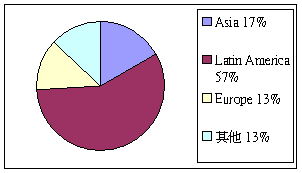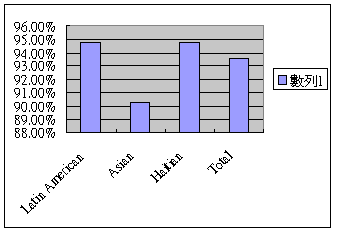
|
||||||||||||||||||||||||||||||||||||
|
美國的語言政策 李勤岸◎哈佛大學東亞語言文明系 |
||||||||||||||||||||||||||||||||||||
|
壹、背景:美國的語言情形 一、原住民的語言情形 Ti7 歐洲人「發現」新大陸進前,北美洲的語言及文化是相當多元的,ti7 現今美國五十州內底有二百外個完全互相be7 通(mutually intelligible)的語言,約屬十五種的語系(language families)(Leap 1981)。 1492年到旦經過五百外冬,美國印地安話 (American Indian languages) 當然是teh 消失中,有寡語言已經完全消失,有的已經真少人teh 講。不過,情形比咱想像khah好,比咱台灣原住民的語言情形好真濟。雖然有政府的壓迫,教會及大多數美國人的壓力,印地安人比hia e5 非英語的新移民對語言的保存做了加真好。有的甚至比以前koh khah 濟語言人口。Navajo 是上界成功的例,有175,000的人teh 講 (Leap 1981)。 雖然按呢講,根據美國人口普查局 (1993)統計,1990年,三分之一以上的美國印地安話及Alaska母語,剩無夠100人有ti7 厝裡teh 講。 Crawford (2000)轉述 Krauss (1995) 的統計,美國有175個原住民語言有人teh 講 。其中89%,抑就是有155個,已經是死亡中的語言(moribund)。到2050年,這155個印地安話攏會失落。 二、移民的語言情形 根據1994年人口普查局(Census Bureau) 的統計,美國有8.7%的人口是ti7 別個國家出生的,有31.8 百萬人ti7 厝裡講英語以外的語言。 Ti7 美國超過300個語言有人teh 講( Headden 1995:38-40)。 Crawford(1992) 形容美國的新移民叫做「ti7 家己土地上的異鄉人」(strangers in their own land)。除了英語語族的主流移民以外,其他所有的移民語言,包括歐洲所有的強勢語言,ti7 美國,攏成做「異鄉人」。 美國是一個移民國家,除了原住民以外攏是移民。有一款是主動性移民,in ui3 其他國家先先後後、陸陸續續自願移民來美國。1820年進前,主要是英國,1820以後,北歐(愛爾蘭、挪威、德國)的移民大量增加,十九世紀末,南歐及東歐移民增加。 Ti7 1900年代,大部份的移民來自歐洲,不過到1990年代,主要來自南美及亞洲: 圖1. 1900 及 1990 外國出生的移民比例 (Tse 2001; Lapham 1993) 1900:
1990: 
表一、外國出生的美國移民數目及比例 (Tse 2001; Lapham 1993)
這個表格並無台灣人,應該是去hou7 中國人hit 的項目食去,無顯示出來。 根據 Colorado 州林義雄博士(2001)的報導 ,2000年的人口普查,全美國的台灣人(包括公民,永久居留,學生,雇聘,非法移民),自認台灣人及各種族台灣人總共有144,795人。 另外一款是被動性移民,是因為被掠來做奴隸的非洲裔美國人,抑是美國去侵略in 的國家,比如講Puerto Rico ,抑是德州、Arizona、新墨西哥州及加州的西班牙語人口 ,Louisiana 的法語人口 ,Hawaii 講南島語的Hawaii人 。 雖然有程度、速度的差別 ,不過整個來講,各種移民攏經驗語言失落(language loss)及語言轉移(language shift),攏漸漸失落in 的母語,緊差慢攏轉移過去英語。 「事實是,除了ti7 真隔離的所在,美國的移民典型是到第三代就失落in 的母語」(Crawford 2000:6)。 貳、美國無國家官方語言 大部份的人攏掠準英語是美國的官方語言。其實,美國並無明文制定英語做in 的官方語言(official language),抑是做國語(national language)。黃宣範(1993:423)講,『美國是世界上所知唯一憲法上沒有明文規定官方語言的國家。 』 雖然美國聯邦政府無明文制訂官方語言,全世界的人攏認為英語是伊的官方語言。為啥麼? Schiffman (1996:211) 分析了真入骨:「美國語言政策的力量並m7 是ti7 法律制訂抑是正式寫出來,是ti7 伊koh khah 微妙的處理(subtler workings),我ka7 叫做隱形及模糊(covert and implicit) 的語言政策。」 Schiffman 講:「...美國這個隱形的語言政策並非中性的,伊『合意』(favours)英語。根本無需要憲章抑是憲法修正案抑是普通法律來維持這個隱形的政策---伊的力量在ti7 美國社會對語言的基本假設。」(ibid.)。伊ka7這個對語言的基本假設稱做「美國語言文化」(American linguistic culture),這個美國語言文化就是美國隱形的語言政策的中心點。 雖然ti7 聯邦層次無制訂官方語言,自從1981年開始一直攏有議員提案要求制訂英語做官方語言,形成英語獨尊運動,這咱beh ti7 後一章來討論。 雖然ti7 聯邦層次無制訂官方語言,不過真濟州卻有明文制訂英語做官方語言,這咱嘛beh ti7 後章討論。 一、為何美國無官方語言 無管是美國獨立宣言抑是聯邦憲法攏無講英語是官方語言,雖然in攏是用英語寫的。 「這m7 是講hia 的開國先祖忽略去,是計畫tek 的政治策略,是真仔細思考過的。」(Heath 1977:272,1981:6)。 Marhall (1986) 歸納出三個原因: 1.英國嘛無官方語言 2.語言是個人選擇的代誌 3.新國家真需要新移民 參、英語獨尊運動 ---Carlos Alberto Montaner 一、英語修正案(ELA) 1981年,加州 的日裔參議員S.I. Hayakawa 首先提出「英語修正案」(ELA, English Language Amendment),要求制訂英語做官方語言。伊提出三個理由:
Hayakawa 同時發起組織一個組織叫做「美國英語」(U.S. English),宣稱有60萬個捐助者 (Headden 1995),會員包括Nobel文學獎得主Saul Bellow,影星Arnold Schwarzenegger,前國會發言人Newt Gingrich。這個組織ti7 1987 開始衰微,不過另外koh 有一個類似的組織產生,叫做「英語第一」(Englsih First),創始人是Larry Pratt,伊是死硬派,伊嘛組織叫做「美國有槍者」(Gun Owners of America)。 過去20冬來,有超過半打的語言修正案ti7 國會提出。有15個國會演說支持,上捷使用的論點就是Hayakawa提出的第一點,英語是結合美國社會的黏劑 (glue),目前這個結合受著多語主義的挑戰。 表二、支持英語修正案國會演說提出的理由的頻率 (1981-1998)(Tse 2001:3)
Ti7 chia 的論點內底,不但國家團結受著威脅 (13),連英語本身嘛受著威脅,若無ka7 英語保存做國語,其他的語言,特別是西班牙語有可能會取代英語 (10)。另外,koh 講新移民無teh 學英語 (7)。Tse (2001) 進一步分析,認為主要是驚新移民無beh學英語,其實這款指控背離事實,所有的移民攏嘛恨be7 得英語會當『一步登天』。為按呢,伊寫規本冊來反駁。 根據1998年Princeton 大學社會學教授Alejandro Portes 及 Johns Hopkskin 社會學教授Lingxin Hao 針對美國上大的移民社區,Florida 的 Miami 及加州 的San Diego移民 5000位八年級及九年級囡仔所做的研究,平均93.6%的囡仔英語攏講了「 好」抑是「真好」。 下面這個圖上界會當證明: 圖二、新移民的囡仔英語講真好(very well)及好(well) 的比例 (Tse 2001; Porters & Hao, 1998) 
二、訂英語做地方官方語言的州 Ti7 德州 Amarillo 有一個法官判一個媽媽「虐待兒童」(child abuse), 因為伊ti7 厝裡參囡仔講西班牙話。 因為聯邦的英語修正案攏無法度通過,真濟地方政府開始採取「地方包圍中央」的策略。 到2000年為止,已經有20州訂英語做官方語言,另外猶有12州有類似的提案猶未通過。 這20州是Alabama (1990), Alaska (1998), Arizona (1988), Arkansas (1987), California (1986), Colorado (1986), Florida (1988), Georgia (1996), Hawaii (1978), Illinois (1969), Indiana (1984), Kentucky (1984), Mississippi (1987), Missouri (1998), Montana (1995), Nebraska (1923), New Hampshire (1995), North Carolina (1987), North Dakota (1987), South Carolina (1987), South Dakota (1995), Tennessee (1984), Virginaia (1981), Wyoming (1996) (Tse 2001:75; Crawford 1999a)。其中上早訂英語做州語的是Nebraska,ti7 1923年 。Illinois ti7 1923年就訂美語(American)做官方語言,1969年不過ka7 美語改做英語。最近才通過的是Alaska,1998年。有的州,比如講Mississippi, Kentucky 及Tennessee,訂英語做官方語言只是象徵作用,宣告對共通語的擁護,並無對居民有甚物負面意義。不過有的州,比如加州,因為有真濟亞洲移民抑是講西班牙話的墨西哥人,通過英語做州語就相當有挑戰意義。 肆、語言屠殺到語言保護──對原住民的語言政策: Crawford (1998:157) 講美國原住民的語言被美國政府設定做語言屠殺 (linguistic genocide) 的目標。 1878年,印地安事務委員會提出報告,認為ka7 囡仔chhoa7 離開父母及部落,hou7 in toa3 ti7 宿舍,按呢來教育兒童是「教化」(civilize) 印地安人上界有效的方法。政府ti7 1879 到1902中間,起25間宿舍學校 (boarding school),ti7 1905年總共有9,736 的學生入學。 Ti7 chia 的學校,囡仔be7 使講母語,若講母語hou2 人掠著,用皮鞭sut 。 這款的教育方法受著真大的批評。1933年,John Collier 擔任印地安事務委員會會長,改革宿舍學校的政策,開始強調原住民的語言及文化,甚至出版印地安話的教科書。 1968年以後聯邦雙語教育法案資助真濟的印地安雙語計畫,出版母語教科書。 1984年,北Ute部落事務委員會宣佈Ute語是北Ute (Northern Ute Nation) 的官方語言。 隔冬,Navajo 部落委員會宣佈 Navajo 語是Navajo族生活、文化及認同e5 最基本成分。這二族攏要求ti7 學校教母語。 1990年Bush 總統簽署美國原住民語言法案(Native American Language Act ),承認美國印地安人、Alaska原住民、Hawaii原住民及美國託管的太平洋群島原住民的語言權。 其中第二章第一條按呢講:美國原住民的語言及文化的狀況是獨特的(unique),美國有責任及原住民做夥行動,來確保chia 的獨特的語言、文化的存活 。 第四章第一條:美國的政策是保存、保護及推廣美國原住民使用、實施以及發展in 的語言的權利及自由。 伍、結論: 美國雖然無ti7 憲法內底明訂英語是國家官方語言,不過這款隱性的語言政策顛倒hou7 英語的地位維持ti7 大家認同的共通語(lingua franca)。美國最高法院 (Supreme Court)一直利用言論自由的『第一修正案』來否決「英語修正案」,使得美國聯邦有「英語是官方語言」的事實,koh 有維護言論自由、維護語言權的好名聲。另外一方面,地方政府各州私下一直通過英語做地方的官方語言。美國雖然無官方語言,英語卻確確實實有伊的官方地位。 Ti7 人類面臨語言死亡的危機之下,美國不應該繼續執行這款「雙面多鬼」的語言政策,害英語成做語言帝國主義的頭號語言殺手。美國應該khah 積極、khah 主動去制訂多語多文化的語言政策,hou7 美國m7 是各移民語言的大熔爐,全部ti7 英語的火爐裡熔熔死,反轉會當hou7 美國成做各種語言共存、色彩繽紛的大彩虹,替人類語言資產的保存盡一點仔心力。 參考文獻
<附錄一> First AmendmentCongress shall make no law respecting an establishment of religion, or prohibiting the free exercise thereof; or abridging the freedom of speech, or of the press; or the right of the people peaceably to assemble, and to petition the government for a redress of grievances. Amendment XIVSection 1. All persons born or naturalized in the United States, and subject to the jurisdiction thereof, are citizens of the United States and of the state wherein they reside. No state shall make or enforce any law which shall abridge the privileges or immunities of citizens of the United States; nor shall any state deprive any person of life, liberty, or property, without due process of law; nor deny to any person within its jurisdiction the equal protection of the laws. Section 2. Representatives shall be apportioned among the several states according to their respective numbers, counting the whole number of persons in each state, excluding Indians not taxed. But when the right to vote at any election for the choice of electors for President and Vice President of the United States, Representatives in Congress, the executive and judicial officers of a state, or the members of the legislature thereof, is denied to any of the male inhabitants of such state, being twenty-one years of age, and citizens of the United States, or in any way abridged, except for participation in rebellion, or other crime, the basis of representation therein shall be reduced in the proportion which the number of such male citizens shall bear to the whole number of male citizens twenty-one years of age in such state. Section 3. No person shall be a Senator or Representative in Congress, or elector of President and Vice President, or hold any office, civil or military, under the United States, or under any state, who, having previously taken an oath, as a member of Congress, or as an officer of the United States, or as a member of any state legislature, or as an executive or judicial officer of any state, to support the Constitution of the United States, shall have engaged in insurrection or rebellion against the same, or given aid or comfort to the enemies thereof. But Congress may by a vote of two-thirds of each House, remove such disability. Section 4. The validity of the public debt of the United States, authorized by law, including debts incurred for payment of pensions and bounties for services in suppressing insurrection or rebellion, shall not be questioned. But neither the United States nor any state shall assume or pay any debt or obligation incurred in aid of insurrection or rebellion against the United States, or any claim for the loss or emancipation of any slave; but all such debts, obligations and claims shall be held illegal and void. Section 5. The Congress shall have power to enforce, by appropriate legislation, the provisions of this article. <附錄二> Native American Language Act (1990) SEC. 102. The Congress finds that-- (1) the status of the cultures and languages of native Americans is unique and the United States has the responsibility to act together with Native Americans to ensure the survival of these unique cultures and languages; (2) special status is accorded Native Americans in the United States, a status that recognizes distinct cultural and political rights, including the right to continue separate identities; (3) the traditional languages of native Americans are an integral part of their cultures and identities and form the basic medium for the transmission, and thus survival, of Native American cultures, literatures, histories, religions, political institutions, and values; (4) there is a widespread practice of treating Native Americans languages as if they were anachronisms; (5) there is a lack of clear, comprehensive, and consistent Federal policy on treatment of Native American languages which has often resulted in acts of suppression and extermination of Native American languages and cultures; (6) there is convincing evidence that student achievement and performance, community and school pride, and educational opportunity is clearly and directly tied to respect for, and support of, the first language of the child or student; (7) it is clearly in the interests of the United States, individual States, and territories to encourage the full academic and human potential achievements of all students and citizens and to take steps to realize these ends; (8) acts of suppression and extermination directed against Native American languages and cultures are in conflict with the United States policy of self-determination for Native Americans; (9) languages are the means of communication for the full range of human experiences and are critical to the survival of cultural and political integrity of any people; and (10) language provides a direct and powerful means of promoting international communication by people who share languages. DECLARATION OF POLICYSEC. 104. It is the policy of the United States to-- (1) preserve, protect, and promote the rights and freedom of Native Americans to use, practice, and develop Native American languages; (2) allow exceptions to teacher certification requirements for Federal programs, and programs funded in whole or in part by the Federal Government, for instruction in Native American languages when such teacher certification requirements hinder the employment of qualified teachers who teach in Native American languages, and to encourage State and territorial governments to make similar exceptions; (3) encourage and support the use of Native American languages as a medium of instruction in order to encourage and support-- (A) Native American language survival, (B) educational opportunity, (C) increased student success and performance, (D) increased student awareness and knowledge of their culture and history, and (E) increased student and community pride; (4) encourage State and local education programs to work with Native American parents, educator, Indian tribes, and other Native American governing bodies in the implementation of programs to put this policy into effect; (5) recognize the right of Indian tribes and other Native American governing bodies to use the Native American languages as a medium of instruction in all schools funded by the Secretary of the Interior; (6) fully recognize the inherent right of Indian tribes and other Native American governing bodies, States, territories, and possessions of the United States to take action on, and give official status to, their Native American languages for the purpose of conducting their own business; (7) support the granting of comparable proficiency achieved through course work in a Native American language the same academic credit as comparable proficiency achieved through course work in a foreign language, with recognition of such Native American language proficiency by institutions of higher education as fulfilling foreign language entrance or degree requirements; and (8) encourage all institutions of elementary, secondary and higher education, where appropriate, to include Native American languages in the curriculum in the same manner as foreign languages and to grant proficiency in Native American languages the same full academic credit as proficiency in foreign languages. NO RESTRICTIONSSEC. 105. The right of Native Americans to express themselves through the use of Native American languages shall not be restricted in any public proceeding, including publicly supported education programs. EVALUATIONSSec. 106. (a) The President shall direct the heads of the various Federal departments, agencies, and instrumentalities to-- (1) Evaluate their policies and procedures in consultation with Indian tribes and other Native American governing bodies as well as traditional leaders and educators in order to determine and implement changes needed to bring the policies and procedures into compliance with the provisions of this title; (2) give the greatest effect possible in making such evaluations, absent a clear specific Federal statutory requirement to the contrary, to the policies and procedures which will give the broadest effect to the provisions of this title; and (3) evaluate the laws which they administer and make recom-mendations to the President on amendments needed to bring such laws into compliance with the provisions of this title. (b) By no later than the date that is 1 year after the date of enactment of this title, the President shall submit to the Congress a report containing recommendations for amendments to Federal laws that are needed to bring such laws into compliance with the provisions of this title. USE OF ENGLISHSec. 107. Nothing in this title shall be construed as precluding the use of Federal funds to teach English to Native Americans. |